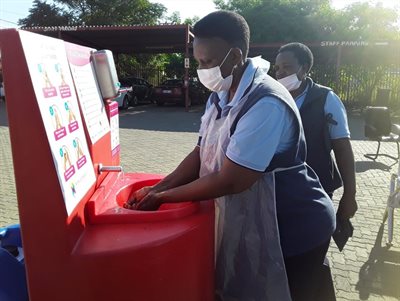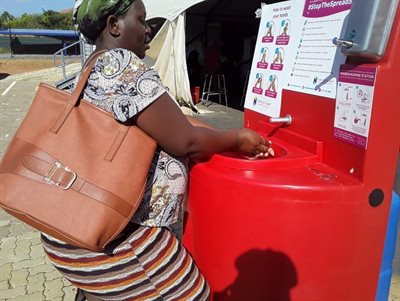Riding the Covid-19 Curve: How one conscious company is doing the extraordinary to help the ordinary

Social media has been full of praise for our government but there are a lot of questions around what the private sector is doing at this time.
It has certainly been inspiring following the daily announcements from companies, but there have been certain standout organisations that have already moved far beyond announcements, working together with the government and focusing efforts on vulnerable communities, in ensuring that SA doesn’t suffer the same fate as countries such as China, Italy and the USA.
One such company is AECI, which may not be known to households but was amongst the very first to mobilise a rapid response plan with the mission to help the most vulnerable communities in the country, from whom they have absolutely nothing to gain, and have also not asked for any recognition.
Over the lockdown period, most organisations have been using the time to align on their plans. However, AECI has already implemented its first round, measured the impact and identified even more areas for investment.
The company has also identified that the needs of vulnerable communities are changing as government response changes, and is also planning to ’Ride the Covid-19 curve’ by responding to these changing needs of communities as the impact of the virus evolves.

So, what is it that they have achieved and what has been the impact?
In less than 30 days, and in the midst of the lockdown, the company has already helped improve the circumstances of over five million South Africans by:
- Targeting child-headed households and orphanages by donating water resources, bars of soap, sanitisers and masks for household use
- Sponsoring a mass behaviour change and educational handwashing programme to the value of R1,73m. Intelligently strategised, the programme ensures education, access to water, access to soaps and handwashing stations in the most vulnerable communities. At least 20 sites in the Covid-19 hotspots were identified and rolled out
- Supporting government clinics and hospitals – the company early on identified that clinics and hospitals could become super-spreading sites if not well-resourced and managed. Patients coming to government clinics are already more likely to die of Covid-19 due to pre-existing conditions like diabetes, respiratory illnesses, cancer and non-communicable diseases. But the clinic environment itself is spatially challenged not allowing for social distancing
- To help, AECI have donated uniquely designed and locally-manufactured handwashing stations. These stations contain education and sensitisation for patients before entering the sites. Sponsored health workers assist in maintaining social distancing and ensuring every patient wash their hands before entering the clinic and learns the correct methods to prevent the spread of the virus
- These interventions will not only help patients but are critical in protecting our frontline. The wellbeing of our health practitioners must be prioritised due to the level of exposure they have
- The estimated reach of this intervention in the current year is 15.5 million patients
Despite the mammoth work it has already achieved, the company feels more needs to be done, and AECI plans to invest even more funds. The initial investments were focused on prevention, and whilst this work must continue, the next phase is focused on food security relief programmes due to impact of the lockdown and job losses, sanitiser distribution to help protect people when moving around post-lockdown and donating rapid testing kits to help expand the net of testing.
The company is also calling out to other organisations to assist in this critical time. The lockdown was a necessary action, however, it has left millions of South Africans destitute and in need of aid. The company’s business activities are underpinned by their values - of being bold, innovative, going green and being engaged and responsible. “Enabling communities with the right tools and education will empower them to stay safe at this particularly challenging time. Responsible engagement with our stakeholders, including communities and regulators, is a cornerstone of AECI’s values. We are indeed stronger together when we work together for a common purpose,” says Mark Dytor, AECI’s chief executive.
“There is no doubt in my mind that we will prevail. This is because South Africans have come together like never before to wage the struggle against this virus together.” – President Cyril Ramaphosa
This article was written by MD of Triple Eight, Sarika Modi. Triple Eight is a multinational impact agency, working in times of healthcare crisis to coordinate efforts of governments and big business.
About AECI
AECI is a diversified group of 16 companies. It has regional and international businesses in Africa, Europe, South East Asia, North America, South America and Australia. Products and services are provided to a broad spectrum of customers in the mining, water treatment, plant and animal health, food and beverage, infrastructure and general industrial sectors.
For more information contact:
Leorna Moya
C 072 100 7343
E az.oc.thgieelpirt@anroel
Sarika Modi
E az.oc.thgieelpirt@akiras